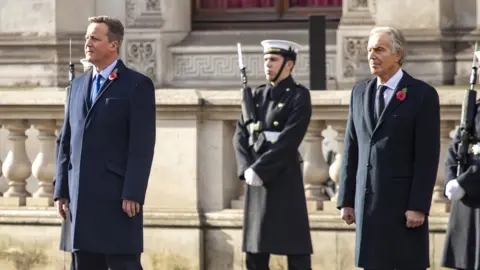UK foreign aid: Cameron and Blair warn against budget cut
 EPA
EPAFormer prime ministers David Cameron and Tony Blair have warned Boris Johnson that cutting the UK's overseas aid budget would undermine the UK's G7 presidency next year and cost lives.
The UK is committed to spending 0.7% of GDP on aid - a global benchmark.
But the government is considering reducing the target to 0.5%, which would have saved around £4bn this year.
Such a decision would be a "moral, strategic and political mistake", Mr Cameron has warned.
Spending on foreign aid is linked to the UK's national income - its GDP - which has been badly impacted by the pandemic.
The government has already announced a £2.9bn cut from the budget for the rest of 2020 so as to avoid over-shooting the 0.7% target.
The 0.7% target, initially proposed by the United Nations in the 1970s, was first adopted in the UK by Mr Blair's Labour government in 2005.
However, it was not actually reached until 2013 - under the coalition government, led by Mr Cameron.
The proportion of GDP spent on aid was 0.24% in 1999, but steadily increased from there.
Speaking to the Daily Telegraph, Mr Blair said Britain's 0.7% commitment had saved millions of lives in the past 20 years by helping to reduce deaths from deadly diseases such as malaria and HIV in Africa.
Millions have also been educated, living standards raised, and life expectancy "dramatically" increased, he added.
The former Labour leader said: "This has been a great British soft power achievement. It isn't about charity. It's enlightened self-interest.
"Neither the challenge of climate or Covid can be met without Africa. Nor can those of extremism and uncontrolled immigration."
Overseas aid budgets were protected from cuts under Mr Cameron and Theresa May, but some Conservatives have argued money should be re-directed to domestic priorities.
The UK's national debt is over £2trillion, and on Friday the Office for National Statistics (ONS) said borrowing hit £22.3bn last month, the highest October figure since monthly records began in 1993.
The overall debt has now reached 100.8% of gross domestic product (GDP) - a level not seen since the early 1960s.
The UK assumes the presidency of the G7, taking over from the US, on 1 January.
Reducing the UK's contributions to foreign aid could also risk alienating President-elect Joe Biden when he enters the White House in January, Mr Cameron and Mr Blair added.
The G7 (or Group of Seven) is made up of the world's seven largest so-called advanced economies: Canada, France, Germany, Italy, Japan, the United Kingdom and the US.
General Lord David Richards, former head of the British Army, backed the former prime ministers, saying it was in the UK's interests to be "as generous as possible", adding: "It's much cheaper than fighting wars."

- PANORAMA 'LIVERPOOL: FIGHTING COVID': "Living under tier three rules just isn't possible"
- ANOTHER WEEKEND IN LOCKDOWN: We have you covered. Thrillingly tense, belly-laugh funny, mind-warpingly weird box sets to binge on BBC iPlayer

